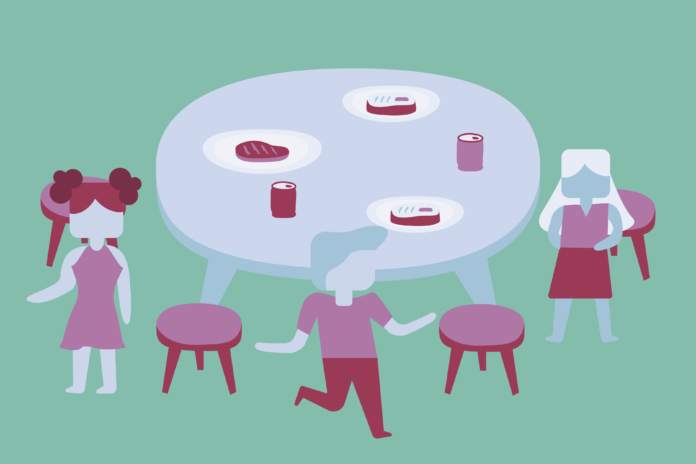Students and staff share how they connect with others through food, even when they cannot physically be together
By MAYA SHYDLOWSKI — features@theaggie.org
Sitting around a table eating food together is a common way for loved ones to come together and celebrate, but organizations on campus are finding ways for members of the community to connect through food in a variety of ways.
For Thanksgiving and many other special occasions, friends and family gather with loved ones to celebrate and connect. Since for many, these celebrations may have looked different the past few years, UC Davis’s Staff and Faculty Health and Well-being group has launched the Connecting through Food project in collaboration with the Global Affairs department to help students and staff reconnect during this transitional period of time between remote and in-person campus activities.
Stacey Brezing is the director of Staff and Faculty Health and Well-being and helped pilot this project.
“We thought about doing this project to really bring people together and to share stories about a recipe, some type of food or a meal that jogs their memory of something they feel connected through,” Brezing said.
For this project, the group invites faculty, staff and students to share their favorite recipes as well as any story or background that goes along with it. They hope to connect with people who may feel disconnected during this time, especially staff members and students who still have not been able to return to campus, Brezing said.
The project is accepting recipe submissions through the end of November, with the potential of an extension into December. The group plans to share all the collected recipes in the spring.
The UC Davis Student Farm is also planning to share recipes collected from students and staff. The Student Collaborative Organic Plant Breeding and Education project (SCOPE) is a program out of the Student Farm that works with organic farmers and emerging markets to produce crop varieties desirable for organic systems and consumer preference.
According to SCOPE’s Junior Speciality Laura Roser, SCOPE is typically a very hands-on program, giving undergraduate students the opportunity to actively participate in the crop breeding process and get their hands in the dirt. However, in the early stages of the pandemic, they were forced to change their structure because student interns were no longer allowed to work on campus.
Roser said they switched from growing food to cooking food. Students could retrieve ingredients from the Student Farm and then go home and make a dish using the SCOPE-grown ingredients. The students submitted the recipes they used these ingredients in, which were collected throughout the pandemic to be turned into a cookbook. Roser said this was their way of engaging with students without physically being together.
Gisselle Orozco is a fifth-year sustainable agriculture and food systems major who has been a SCOPE intern since before the pandemic. She has been a driving force behind the cookbook, which will be posted to the SCOPE website at the end of this quarter. Orozco said recipes students and faculty submitted included family recipes, as well as a lot of recipes from online that were adapted to use SCOPE ingredients.
Both Roser and Orozco have fond memories of how food connected them with others even before the cookbook.
“When I think about my family, I picture them in the kitchen,” Orozco said. “We spent a lot of time together, especially when we used to have big get-togethers. We’d all get in the kitchen. Half of the people are cooking, [while] half of the people are sitting around the table talking. It’s just a really great way to share culture.”
She remembers learning about her family and culture through stories told in the kitchen. Orozco said that her parents are from different areas of Mexico, so they made different foods and taught her how to make dishes she couldn’t just find in the grocery store.
“That’s kind of like how you get to know your family — in the kitchen,” Orozco said.
Roser said she also connected with her family through food, especially in her childhood home’s garden. As a kid, she remembers growing vegetables with her mom in their backyard. Now, she is able to use that foundation in her own garden and when she teaches students about growing crops.
Growing and gardening is a common theme on campus for people to build connections with others. UC Davis even has five acres of plots available for the greater community to grow their own plants. The ASUCD Community Garden rents plots to undergraduate and graduate students, staff, faculty and other members of the community. Carolin Hallock, a third-year environmental science and management major and an ASUCD Garden Manager, explained that the garden is a great way for students to connect with others who share their love for growing food.
“It’s very community-driven because there are so many people, and you’re right next to your neighbors,” Hallock said. “And there’s always people in the garden talking.”
The garden also holds weekend work parties when the gardeners are invited to work together on their garden plots. Many people who come bring snacks and homemade pastries to share. The gardeners also often share their crops when they have a bountiful harvest.
“If they have a lot of vegetables, they’ll go around to their neighbors and share, or some gardeners will trade with each other,” Hallock said. “One time I was at the garden, and one of the gardeners came up to me and said, ‘I have so many habaneros, do you want some?’ She told me to go get a plastic bag from my car, and she just kept filling it full of them. I have them still frozen in my freezer. The garden is a great way to make friendships and share.”
Meanwhile, another group on campus trying to bring people together through food is led by Borah Lim, a master’s student in the international agricultural development program. She piloted her project, Aggies Grow Veggies, during the 2020-2021 school year. The project aims to make gardening more accessible and affordable to students, allowing them to learn about how food is grown and have access to healthy foods.
The project launched multiple workshops which taught students how to grow vegetables and provided them with their own complementary gardening kits. The workshops brought together people from different backgrounds with different perspectives, Lim said. She hoped to help the students connect with nature and the roots of their food.
Lim said that she didn’t get involved with growing food until college. After she completed her bachelor’s degree, Lim taught children at elementary schools about cooking and gardening. She enjoyed this experience so much that she decided to focus her graduate work on helping students build a community through food and teaching them how that food is grown.
Lim shared that food has brought her together with the people in her life as well.
“Growing up in a Korean-American family, food is a huge way that brings people together,” Lim said. “Whenever we have a celebration or reunion, we always cook a whole bunch of different foods that take so much time. My mom will ask me to help cut and peel the veggies or do this or that.”
People from many backgrounds have similar experiences of growing, cooking and eating food together. While holiday celebrations may not look the same as they did before the pandemic, many families will still gather this holiday season to share memories, laughs and most importantly, food.
“Food is such a love language, for my family and for myself,” Lim said. “And so the way that we get to share it together, definitely makes it a community thing.”
Written by: Maya Shydlowski — features@theaggie.org



